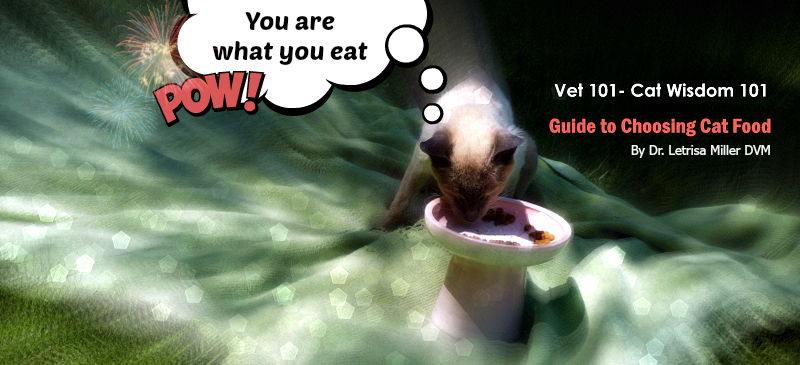
Vet101: Guide to Choosing Cat Food and Avoid Food Poisoning
UPDATED: Our regular Vet 101 contributor veterinarian, Dr. Letrisa Miller shares her tips on choosing the best cat food and how to avoid food poisoning. It turns out, there is much more to know than reading a label. Dr. Miller has a feline-only practice in Manchester Conn.

Vet 101: The Ultimate Guide to Choosing Cat Food and Avoid Food Poisoning.
Choosing a cat food can be an difficult task, even for a veterinarian. Most foods on the market have little to do with the health and well being of your cat and everything to do with marketing and profits for the company making the food, so it can be hard to sift through all of the hype and get to the basics for cat nutrition.The important thing to keep in mind for your cat is that it is an obligate carnivore (must have a diet consisting of prey). This does not mean that it should eat meat alone. It means that your cat should naturally eat whole prey. Eating whole prey includes eating not just meat, but small bones, organs and the contents of most of the gastrointestinal tract of the prey.
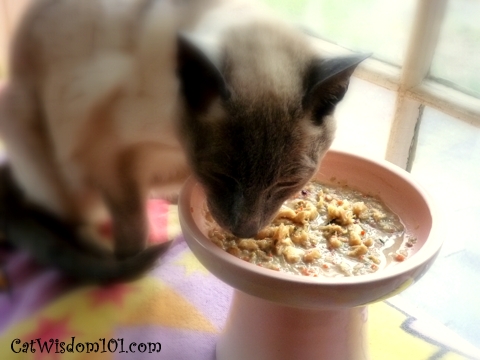
Why not just meat? Meat is poor in most nutrients other than protein, and while protein is the major nutrient needed by cats, other nutrients such as calcium (bone), vitamins and minerals (GI tract, organs), and roughage (skin and hair or feathers). Trace nutrients and electrolytes are also found in parts of the prey that are not meat.Because of the need for all of these other nutrients, by-products are NOT a bad thing in foods. They provide essential nutrients that then don’t have to be added as synthetic compounds to create a balanced diet.
I try to choose food for cats by thinking of what they would naturally eat if they were catching prey. With that in mind, small mammals, rabbits, lizards, earthworms, insects, snakes and an occasional bird are what the menu should include. A cat’s natural diet is 60 to 72% protein and 2 to 4% carbohydrate with the balance as fat. The best we can do with non-prescription commercial diets is to feed foods that are similar to this, limiting our choices to poultry, and rabbit. We need some small mammal based diet to choose from, but none are currently available.
Fish and milk are not ideal cat foods but fresh water fish (i.e.trout) are more appropriate. Ocean fish with white flesh are very high in an amino acid that is converted to histamine (the compound released in the body that causes allergic-type inflammation). Fish used in pet foods is not handled well in most cases, so it is not fresh when it is processed and has a large amount of histamine in it.https://en.wikipedia.org/wiki/Histamine Fish is the most common food allergen in my practice.
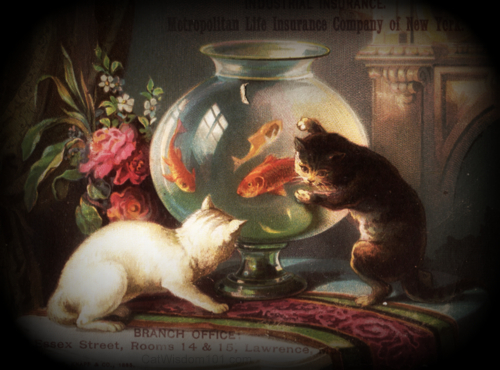
Most cats are lactose intolerant and milk can give them a stomach ache and diarrhea. It is also a common allergen.
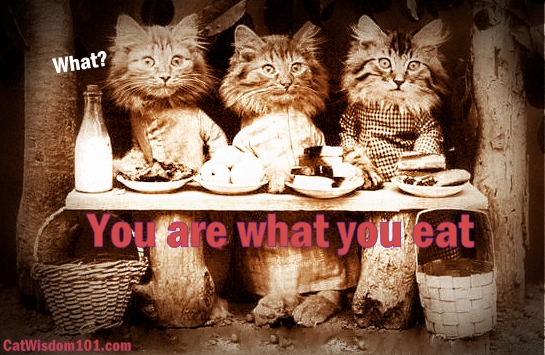
Cats do not have sufficient levels of enzymes in their gastrointestinal tract to digest fruits and vegetables, and should not be fed these items. Some of them can even be harmful, such as cranberries, blueberries and spinach which make oxalate in the GI tract and body, making cats at risk for developing calcium oxalate urinary tract stones. In fact, any source of vitamin C should be avoided because cats make their own vitamin C and excess is converted to oxalate and excreted through the kidneys making the cats much more likely to develop calcium oxalate kidney or bladder stones.
Flax seed is a source of omega-3 fatty acids for humans, but is NOT usable by cats. If it is in a cat food, it is there for marketing, not your cat.
Dry diets vs. canned diets: canned is better, but dry won’t kill your cat if it is of reasonable quality. Some cats just won’t eat canned diets and some people’s lives are not predictable enough to feed a canned only diet. Cats that do eat predominantly dry diets do tend to be chronically dehydrated and because of this can develop urinary tract disease or have long term kidney damage. To avoid complications related to dehydration a water fountain and/or enticements to drink such as offering chicken broth ice cubes should be provided.
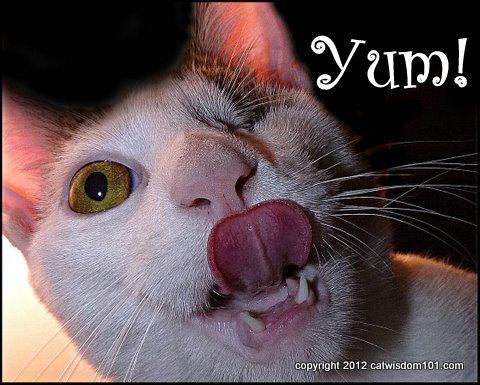
Dr. Miller’s RECOMMENDATIONS:
- Find a diet that has as simple an ingredient list as possible. The best is poultry and/or rabbit and supplements to make the diet balanced. Fish and beef should be avoided. I avoid grains as they are high in carbohydrates and do not contribute any well digested protein in a cat’s diet. Grains are not inherently bad, just are not normal in a cat’s diet.
- Find a diet that is at an absolute minimum 35% protein from animal sources (not glutens) unless your cat has kidney failure (IRIS stage 4) (failure, not insufficiency). My recommendation is for 40 to 50% protein (dry matter) or higher if at all possible. Canned diets containing 10% (as fed) protein have around 40% protein on a dry matter basis (water is taken out of the equation). Canned foods are generally 75 to 80% water which dilutes the protein, resulting in an as fed percentage that is lower on the label than that seen on a dry food analysis because the dry food generally will have less than 10% water.
- Find a diet that does not have fruits and vegetables if possible. Cats don’t have the enzymes to digest them so they are only a source of fiber and food for bacteria in the colon. (See above)
- Cooked ground meat with added supplements (I recommend BalanceIT at https://secure.balanceit.com/tools/recipegenerator/) is an acceptable diet as long as the supplement is used exactly as recommended and the recipe generated for your cat is followed every time. Ground meat should never be fed raw. Bacteria from the surface have been mixed throughout the meat and it is a perfect environment for Salmonella, E. coli and Listeria to grow in.
- Partially cooked chunked meat can be fed using a recipe generated by BalanceIT. Cook the outside of the meat to kill bacteria on the outside of it by dropping it into boiling water for 2 minutes. It can then be added to supplements to make a safe partially raw diet. It can be chopped immediately before serving. Meats that are not consumed immediately after butchering are not safe to eat without cooking due to bacterial growth on the exposed surfaces, so I do not recommend feeding completely raw meat unless you are butchering it yourself.

Cats can and do get food poisoning and it can be life threatening. How to avoid food poisoning.
- All food should be treated just like you would your own food.
- Meats and canned food should not be left out longer than two hours and all unused portions should be immediately refrigerated.
- Canned foods should be removed from the can before it is put in the refrigerator and covered. Glass or ceramic is best for storage so that no smell or taste is imparted to the food from the container.
- Dry foods are more likely to be contaminated with E.coli or Salmonella when coming from the manufacturer, so adding water to it can be more dangerous than adding water to canned diets.
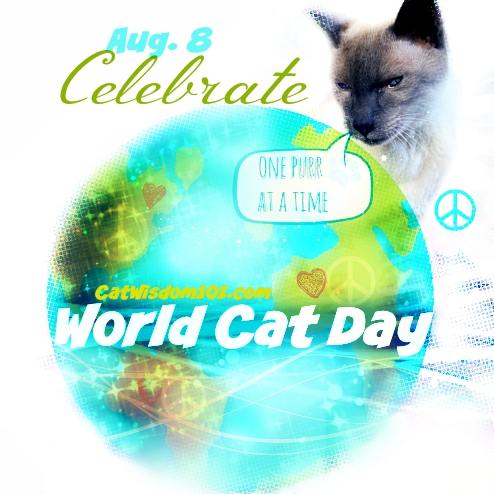


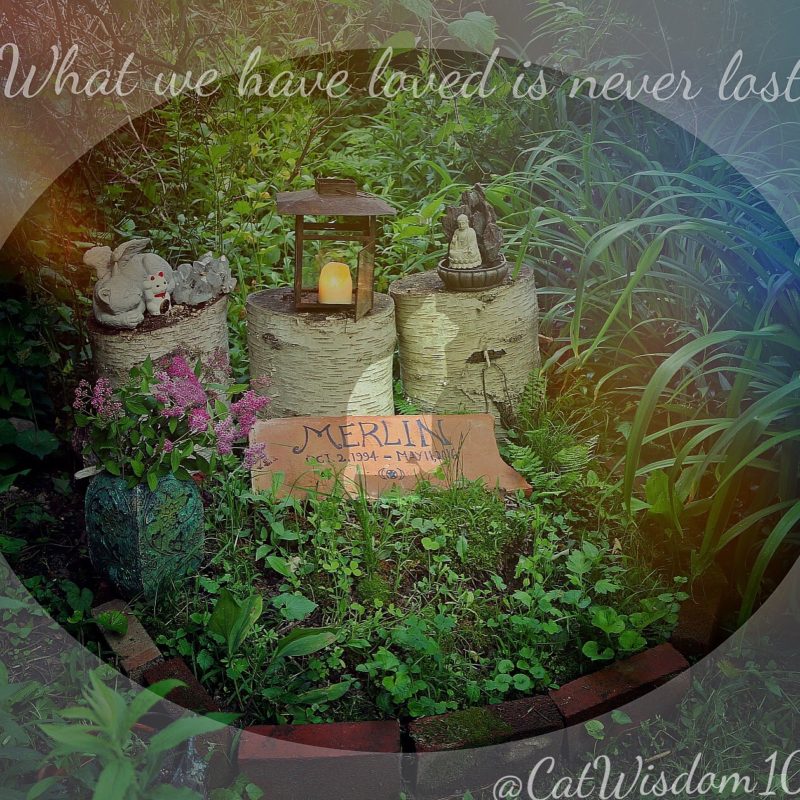

18 Comments
Bev Green
Great post and super informative..we should approach their diets as we do our own with as much thought to how it got to us as what it is 🙂 hugs Fozziemum
meowmeowmans
Thanks for this really informative post! We get mostly wet food here, with some dry. We are glad to know that is okay. 🙂
Pawesome Cats
Good nutrition is vital for our kitties – thanks for an informative post.
The Island Cats
Thanks for all the info. The mom feeds us good quality canned foods…but we do get the occasional dry food, too. Glad to hear that it’s okay…as long as it’s good quality.
Cats of Wildcat Woods
Good to know about the fish – some vets say it is not good for cats but no one ever says why.
Dezi and Lexi
Gweat posty. And fanks fur da raw diet link. Have a gweat day.
Luv ya’
Dezi and Lexi
Skeeter And Izzy
We will have to reread this and compare our foods to the list. I wish that they didn’t put anything artificial or un needed in foods for pets…I.E. dyes.
I do find it amazing that many of the “natural” foods do contain cranberries etc in them.It is very confusing. I wish we could afford to feed a raw diet.
Luvs and kisses to all
Skeeter and Izzy and the Feral Gang + Twig & Peanut & Romeo >^..^^..^<~
Austin Towers
Very interesting!! The only problem is I only eat fish based wet food!! The Staff tries to make me eat rabbit etc, but I won’t. She makes up for it by cooking me fresh chicken a couple of times a week!
greg1948
Whenever I read about what foods are good for cats to keep them healthy, my brain always wants to explode! I copied this info so I can study it later, when the head swelling subsides. I am continually trying to figure out what is the best to purchase. That’s what I need–a list! The fine print on cans and bags is hard to read.
The Swiss Cats
We don’t like so much chicken or poultry, and Mum cannot totally keep fish or beef out of our diet if she wants us to eat our canned food. Thanks for the tip of removing the food from the can before refrigerating it ! Purrs
Ellen Pilch
This is an excellent post. I always worry that I am not feeding my kitties as well as I should.
Annabelle
There was a lot of good information in this!
Kathryn
Wow, such good info. I don’t feed them fish — after what happened to Cheddar in 2012 with the struvite crystals — and no luncheon meat, ever. Did not know that about the beef. I feed them Friskies’ canned with Shreds. They only eat the gravy in Bits and Filets, so I don’t give them that preparation. I will stop buying Beef with Shreds, so that means Turkey and Giblets with Shreds and Chicken with Shreds. Plus Purina Indoor dry. I don’t have a fountain, but I change their water 4 x a day, from the bathroom, which is colder. Baby food (ham or turkey) (plain) rarely. About 4 times a year.
Brian Frum
Dang, there was a lot of stuff in there we didn’t know…like the fridge thing.
easy rider
that was interesting to read about the enzymes, I had no clue… so it means that a lot of things we see in commercials are just there to attract the humanoid eye and there is no helpful effect…
Sometimes Cats Herd You
We hadn’t thought about removing canned food from the can before covering it and putting it in the fridge. We’ll have to read up on why removing it from the can helps prevent food poisoning, because we had never heard that tip before. Storing in ceramic or glass makes sense, though. Thanks for pointing this out!
Hannah and Lucy
We won’t eat anything fish flavoured but Mum doesn’t know why.
Luv Hannah and Lucy xx xx
Summer
My human tries to keep fish out of our diet for the most part. Some sneaks through in a poultry or rabbit flavor food (I don’t know why some companies add fish to their land critter flavors), but she only allows that now and again.